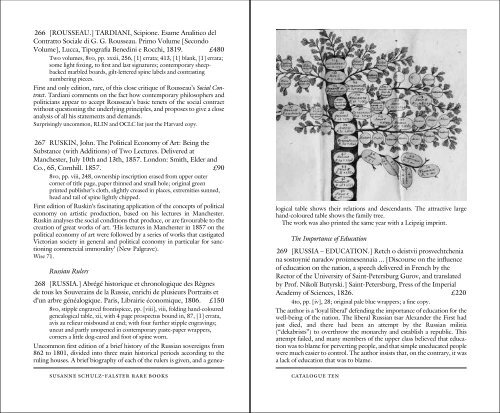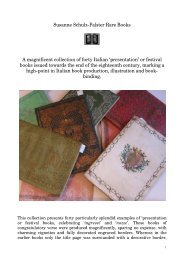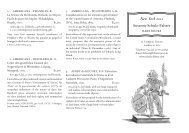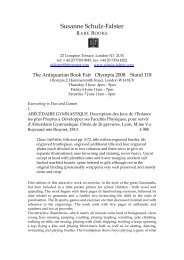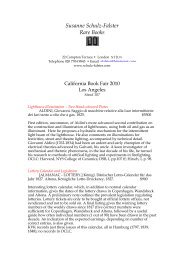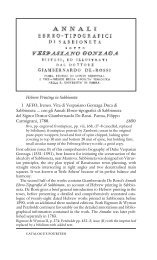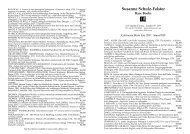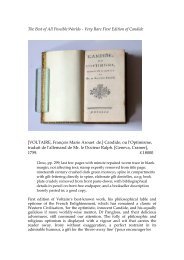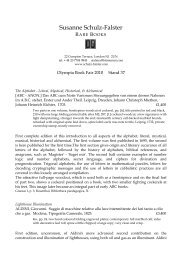Susanne Schulz-Falster Catalogue Ten - Schulz-Falster Rare Books
Susanne Schulz-Falster Catalogue Ten - Schulz-Falster Rare Books
Susanne Schulz-Falster Catalogue Ten - Schulz-Falster Rare Books
Create successful ePaper yourself
Turn your PDF publications into a flip-book with our unique Google optimized e-Paper software.
266 [ROUSSEAU.] TARDIANI, Scipione. Esame Analitico del<br />
Contratto Sociale di G. G. Rousseau. Primo Volume [Secondo<br />
Volume], Lucca, TipograWa Benedini e Rocchi, 1819. £480<br />
Two volumes, 8vo, pp. xxxii, 256, [1] errata; 413, [1] blank, [1] errata;<br />
some light foxing, to Wrst and last signatures; contemporary sheepbacked<br />
marbled boards, gilt-lettered spine labels and contrasting<br />
numbering pieces.<br />
First and only edition, rare, of this close critique of Rousseau’s Social Contract.<br />
Tardiani comments on the fact how contemporary philosophers and<br />
politicians appear to accept Rousseau’s basic tenets of the social contract<br />
without questioning the underlying principles, and proposes to give a close<br />
analysis of all his statements and demands.<br />
Surprisingly uncommon, RLIN and OCLC list just the Harvard copy.<br />
267 RUSKIN, John. The Political Economy of Art: Being the<br />
Substance (with Additions) of Two Lectures. Delivered at<br />
Manchester, July 10th and 13th, 1857. London: Smith, Elder and<br />
Co., 65, Cornhill. 1857. £90<br />
8vo, pp. viii, 248, ownership inscription erased from upper outer<br />
corner of title page, paper thinned and small hole; original green<br />
printed publisher’s cloth, slightly creased in places, extremities sunned,<br />
head and tail of spine lightly chipped.<br />
First edition of Ruskin’s fascinating application of the concepts of political<br />
economy on artistic production, based on his lectures in Manchester.<br />
Ruskin analyses the social conditions that produce, or are favourable to the<br />
creation of great works of art. ‘His lectures in Manchester in 1857 on the<br />
political economy of art were followed by a series of works that castigated<br />
Victorian society in general and political economy in particular for sanctioning<br />
commercial immorality’ (New Palgrave).<br />
Wise 71.<br />
Russian Rulers<br />
268 [RUSSIA.] Abrégé historique et chronologique des Règnes<br />
de tous les Souverains de la Russie, enrichi de plusieurs Portraits et<br />
d’un arbre généalogique. Paris, Librairie économique, 1806. £150<br />
8vo, stipple engraved frontispiece, pp. [viii], viii, folding hand-coloured<br />
genealogical table, xii, with 4 page prospectus bound in, 87, [1] errata,<br />
avis au relieur misbound at end; with four further stipple engravings;<br />
uncut and partly unopened in contemporary paste-paper wrappers,<br />
corners a little dog-eared and foot of spine worn.<br />
Uncommon Wrst edition of a brief history of the Russian sovereigns from<br />
862 to 1801, divided into three main historical periods according to the<br />
ruling houses. A brief biography of each of the rulers is given, and a genea-<br />
susanne schulz-falster rare books catalogue ten<br />
logical table shows their relations and descendants. The attractive large<br />
hand-coloured table shows the family tree.<br />
The work was also printed the same year with a Leipzig imprint.<br />
The Importance of Education<br />
269 [RUSSIA – EDUCATION.] Retch o deistvii prosvechtchenia<br />
na sostoynié naradov proiznesennaia ... [Discourse on the inXuence<br />
of education on the nation, a speech delivered in French by the<br />
Rector of the University of Saint-Petersburg Gurov, and translated<br />
by Prof. Nikolï Butyrski.] Saint-Petersburg, Press of the Imperial<br />
Academy of Sciences, 1826. £220<br />
4to, pp. [iv], 28; original pale blue wrappers; a Wne copy.<br />
The author is a ‘loyal liberal’ defending the importance of education for the<br />
well-being of the nation. The liberal Russian tsar Alexander the First had<br />
just died, and there had been an attempt by the Russian militia<br />
(“dekabrists”) to overthrow the monarchy and establish a republic. This<br />
attempt failed, and many members of the upper class believed that education<br />
was to blame for perverting people, and that simple uneducated people<br />
were much easier to control. The author insists that, on the contrary, it was<br />
a lack of education that was to blame.


